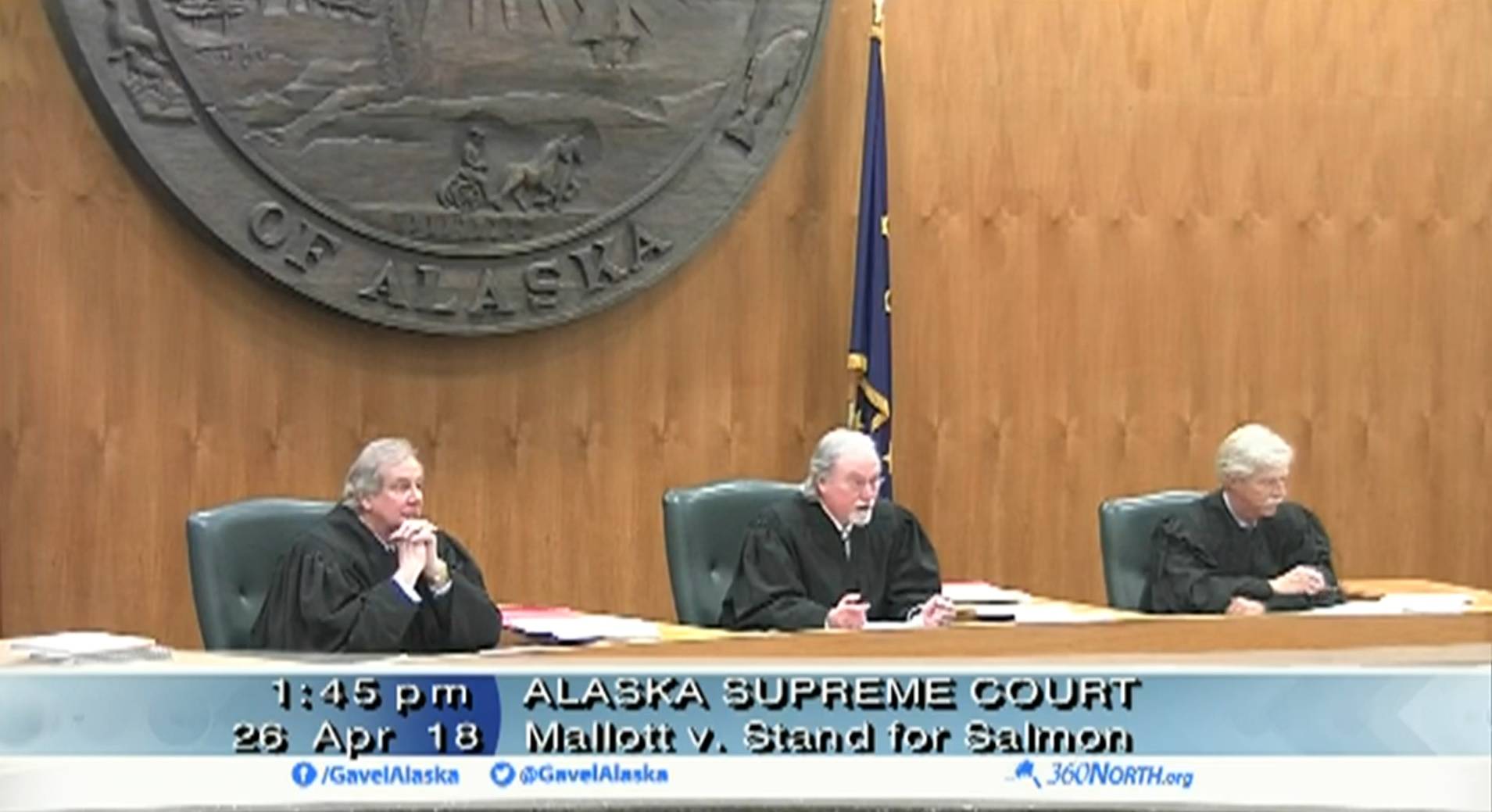The Alaska Supreme Court heard oral arguments Thursday in a case that will decide the fate of a pro-fisheries ballot initiative earmarked for the November election.
Looming behind the justices was an enormous symbol of the argument: A copy of the state seal bearing a variety of Alaska icons including mining, the Alaska Railroad, and a solitary salmon.
In Mallott v. Stand for Salmon, the State of Alaska is attempting to overturn an Superior Court decision that found the ballot initiative acceptable.
For almost an hour, the five justices heard arguments from Solicitor General Joanne Grace, representing the state, and Valerie Brown, an attorney from Trustees for Alaska, which is representing the ballot measure group Stand for Salmon.
“We hope you will affirm the superior court and let this process of direct democracy proceed to the ballot,” Brown told the justices.
At its core, Thursday’s arguments were about the meaning of an obscure clause of the Alaska Constitution and whether the proposed ballot measure violates it. Stand for Salmon’s ballot measure proposes a sweeping reform of the state’s process for permitting construction projects that affect salmon streams in Alaska.
The State of Alaska contends that the ballot measure is so sweeping that it effectively allocates salmon streams and other bodies of water for fish alone.
“17FSH2 is the equivalent of a bill banning all discharge (into streams),” Grace said.
Article XI, Section 7 of the Alaska Constitution says that a ballot measure cannot “make or repeal appropriations,” and prior court rulings have found that the restriction applies to appropriations of public land and water, not just money.
In written arguments, and orally to the court on Thursday, Grace contends that the Stand for Salmon measure crosses that line because it creates standards so high that they cannot be met.
“It wouldn’t ban all of anything,” Brown said in opposition.
She told the justices that the initiative is more appropriately a “regulatory proposal,” such as have appeared on the ballot before. In 2014, after a series of court challenges, voters approved a measure requiring the Alaska Legislature to approve large-scale mines in Bristol Bay. The measure, seen as targeting the proposed Pebble Mine, passed by a 66-34 margin.
This year’s debate is about a much broader proposal, one that would affect projects across the state, and not just mines. Permits are required for roads, pipelines and all structures that cross salmon-bearing streams, and the measure would affect all of these.
Partially for that reason, industry groups are lining up in opposition to the measure. The Alaska Oil and Gas Association, ANCSA Regional Association and Council of Alaska Producers submitted documents in support of the state’s position.
The Bristol Bay Fishermen’s Association and Ekwok Village Council also offered their support for the state’s position, but for a different reason.
“From our position, this initiative does too much to help Pebble,” attorney Geoffrey Parker, representing the two groups, said by phone Thursday.
The justices did not take a definitive stance on either argument made by the two primary parties in the lawsuit, but they did appear to be leaning toward a Solomonic solution. Several times, justices asked whether it would be possible to delete unconstitutional portions of the initiative and allow the rest to proceed to the ballot.
“They certainly spent a good amount of time talking about that,” said Katherine DeMarest, a state attorney who supported Grace at Thursday’s hearing.
The portion of the initiative that came under particular scrutiny by the judges included sections pertaining to restrictions placed on large projects, particularly large mines. Judges repeatedly asked whether it is even possible for large mines to operate under the restrictions proposed by the ballot initative.
Brown, speaking by phone after the hearing, said that while they did spend time addressing the possibility of deleting — formally called “severing” — those sections, it’s not fair to say that’s what will happen in the end.
“You can’t really tell from argument what they’re planning on doing. They ask a lot of questions,” she said. “I wouldn’t say it’s fair to say they’re definitely going to sever.”
If the judges delete one section, it would be an action almost without precedent. Only once before, in 1988, has the Alaska Supreme Court taken that step, and in that case, it deleted only one sentence.
(The measure in that case, involving a community college program for Alaska, was defeated at the ballot box.)
The justices did not take any immediate action Thursday, as is normal for Supreme Court cases. The justices will analyze the arguments offered in print and orally, then return a decision in a matter of weeks.
Grace told the justices that as long as a decision comes before Sept. 5, the Alaska Division of Elections will have enough time to print ballots, regardless of the verdict.
• Contact reporter James Brooks at jbrooks@juneauempire.com

